Nations League 2019: What's at stake in final week of group games?
Germany could be relegated and Wales could take their place. England could win the whole Nations League - or be relegated.
The group stage comes to an end in this international break, which runs from Thursday to Tuesday, with practically everything still to play for.
Only four of the 24 group winners, promotion and relegation places have been decided so far.
England could still win their group to reach next year's Nations League finals - or could finish bottom and drop to League B.
Wales are in promotion and Euro 2020 play-off contention, Northern Ireland and the Republic of Ireland are battling relegation - while Scotland could be promoted or relegated from League C.
In the bottom tier, Luxembourg and Kosovo are looking to secure a Euro 2020 play-off place.
BBC Sport talks you through the permutations of who needs what from the home nations, the Republic of Ireland and at the bottom and top of the tournament in the final two games.
A reminder of how it all works...
This is a very quick recap as there are many dedicated articles available on how the inaugural Nations League works.
The winners of all 16 groups go into the Euro 2020 play-offs, unless they qualify through the regular qualifiers next year, in which case the next best team in their league take a play-off place.
There are four Euro 2020 places up for grabs via the Nations League, with the winner of each tier's play-off taking one of them. For the most part, play-offs are held among teams in the same tier - so giants will face giants, minnows will face minnows etc.
The teams who win the four divisions in League A go into a four-team knockout final tournament in June 2019 to decide the winners of the Nations League.
Countries who win the groups in the lower three tiers all get promoted to the higher division for the 2020-21 event. Teams who finish bottom in each group are relegated (except those in the bottom division).
Teams level on points are separated by head-to-head record before goal difference - for a more detailed breakdown, read the bottom of the article.
Nations League 2019: What's at stake in final week of group games?
Germany could be relegated and Wales could take their place. England could win the whole Nations League - or be relegated.
The group stage comes to an end in this international break, which runs from Thursday to Tuesday, with practically everything still to play for.
Only four of the 24 group winners, promotion and relegation places have been decided so far.
England could still win their group to reach next year's Nations League finals - or could finish bottom and drop to League B.
Wales are in promotion and Euro 2020 play-off contention, Northern Ireland and the Republic of Ireland are battling relegation - while Scotland could be promoted or relegated from League C.
In the bottom tier, Luxembourg and Kosovo are looking to secure a Euro 2020 play-off place.
BBC Sport talks you through the permutations of who needs what from the home nations, the Republic of Ireland and at the bottom and top of the tournament in the final two games.
A reminder of how it all works...
This is a very quick recap as there are many dedicated articles available on how the inaugural Nations League works.
The winners of all 16 groups go into the Euro 2020 play-offs, unless they qualify through the regular qualifiers next year, in which case the next best team in their league take a play-off place.
There are four Euro 2020 places up for grabs via the Nations League, with the winner of each tier's play-off taking one of them. For the most part, play-offs are held among teams in the same tier - so giants will face giants, minnows will face minnows etc.
The teams who win the four divisions in League A go into a four-team knockout final tournament in June 2019 to decide the winners of the Nations League.
Countries who win the groups in the lower three tiers all get promoted to the higher division for the 2020-21 event. Teams who finish bottom in each group are relegated (except those in the bottom division).
Teams level on points are separated by head-to-head record before goal difference - for a more detailed breakdown, read the bottom of the article.
Croatia v Spain (Thursday, 15 November - 19:45 GMT)
England v Croatia (Sunday, 18 November - 14:00 GMT)
A lot of England's hopes depend on what happens when Croatia face Spain. If Spain win that game, then England cannot top the group, or win the tournament.
However if Spain fail to win, then an England victory over Croatia on Sunday, 18 November (14:00 GMT) would take them to next June's finals. It would also guarantee a Euro 2020 play-off place - if England fail to progress through next year's regular qualifiers.
But regardless of that Croatia-Spain result, a Croatian win at Wembley would relegate England to League B. If Croatia beat Spain, then a score draw in London would also send the Three Lions down.
That is because if teams are level on points, they are separated by head-to-head record, including the away goals rule if necessary, before goal difference comes into play and England drew 0-0 in Rijeka.
Wales (and Republic of Ireland)
Wales v Denmark (Friday, 16 November - 19:45 GMT)
Denmark v Republic of Ireland (Monday, 19 November - 19:45 GMT)
Wales' fate is in their hands. If they beat Denmark in Cardiff, they will win Group B4, be promoted to the top flight and guarantee a Euro 2020 play-off place.
If Denmark win, then they will guarantee top spot in the group and Wales will finish second. A draw means they would then have to wait for the result of Denmark v Republic of Ireland.
In that scenario, a Denmark win against the Irish would make them group winners and leave Wales in second.
The Republic of Ireland will be relegated unless both results go their way. They are down unless Denmark lose to Wales. If Wales do beat the Scandinavians, then an Irish win in Aarhus would save them - and relegate Denmark instead.
Northern Ireland
Austria v Bosnia-Herzegovina (Thursday, 15 November - 19:45 GMT)
Northern Ireland v Austria (Sunday, 18 November - 17:00 GMT)
Northern Ireland are out of play-off contention and, like the Republic, need two results to go their way if they are to stay up.
If Austria avoid defeat at home to Bosnia-Herzegovina on 15 November, then Michael O'Neill's side are relegated. If the Austrians do lose that one, then Northern Ireland must beat them by more than one goal in Belfast on 18 November to survive. A three-goal Bosnia win over Austria would mean NI could go through with a 1-0 victory.
Scotland
Albania v Scotland (Friday, 16 November - 19:45 GMT)
Scotland v Israel (Tuesday, 20 November - 19:45 GMT)
Scotland will be promoted - and guarantee a Euro 2020 play-off spot - if they beat Albania away and Israel at home.
But they will be relegated to the bottom tier, the same level as San Marino and Liechtenstein, if they are beaten in both games.
There are a lot of different possibilities (nine in total), so here they are in bullet-point form...
If Scotland beat Albania...
- And beat Israel - Scotland win the group
- And draw or lose against Israel - Scotland finish second
If Scotland draw with Albania...
- And beat Israel - Scotland win the group
- And draw or lose against Israel - Scotland finish second
If Scotland lose to Albania...
- And beat Israel - all three teams will be on six points so it goes down to goal difference, then goals scored, then away goals
- And draw or lose against Israel - Scotland finish bottom
How about the big teams?
As things stand, France, Belgium, Portugal and Spain will be in the June 2019 finals - although all those places are up for grabs.
Germany are facing relegation to League B after picking up only one point from three games. They will be relegated without playing if the Netherlands beat France on 16 November. If France win that game, then Germany need to beat the Dutch on 19 November to survive.
France only need a draw in their game with the Dutch to win the group and reach the finals. But if the Netherlands win both their games, they will top that group.
Belgium will reach the finals if they do not lose against Switzerland, who also have six points but only one game left, on 18 November. If the Swiss win, then they could win the group - but it would depend on the scoreline of their victory if Belgium have beaten already relegated Iceland three days earlier.
Portugal only need a draw in Italy on 17 November to reach the finals. Even if they lose, a win over relegated Poland three days later would be enough for them to top the group.
Spain will win their group if they beat Croatia on 15 November. However, anything else opens the door for England. Croatia, who are bottom, will win the group if they beat Spain and England. They will survive if they beat England - or beat Spain and get a score draw in London.
Ukraine have already guaranteed promotion to the top division, while Russia, Bosnia-Herzegovina and Wales are in pole position to take the other slots.
And what about the bottom division?
The unique way the Nations League is run means that four of Europe's bottom 16 will make the Euro 2020 play-offs - and one will qualify for the tournament.
Georgia have taken a spot, as well as winning promotion, by winning their group. Luxembourg are leading Belarus by one point in their pool, with Kosovo two points clear of Azerbaijan and Macedonia three points clear of Gibraltar and Armenia.
Each team in League D has two games left to play, so there are too many permutations to work out - although two wins for any of the three group leaders not yet promoted would be enough to take them into the March 2020 play-offs.
San Marino are the only team in the bottom league yet to pick up a point, but luckily for them relegation is impossible as there is no fifth league for anybody to drop into.
How teams level on points are separated
(Article 15.01 of 2018-19 Uefa Nations League regulations)
a. higher number of points obtained in the group matches played among the teams in question;
b. superior goal difference from the group matches played among the teams in question;
c. higher number of goals scored in the group matches played among the teams in question;
d. higher number of goals scored away from home in the group matches played among the teams in question;
e. if after having applied criteria a) to d), teams still have an equal ranking, criteria a) to d) are reapplied exclusively to the matches between the remaining teams to determine their final rankings. If this procedure does not lead to a decision, criteria f) to l) apply in the order given to the two or more teams still equal;
f. superior goal difference in all group matches;
g. higher number of goals scored in all group matches;
h. higher number of away goals scored in all group matches;
i. higher number of wins in all group matches;
j. higher number of away wins in all group matches;
k. lower disciplinary points total based only on yellow and red cards received in all group matches (red card = 3 points, yellow card = 1 point, expulsion for two yellow cards in one match = 3 points);
l. position in the UEFA national team coefficient rankings

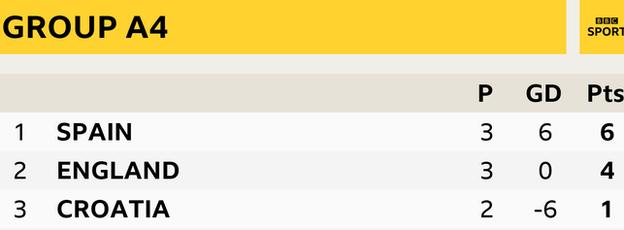
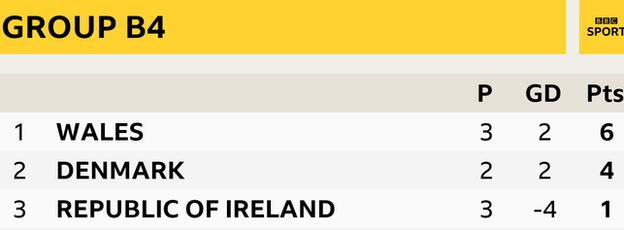
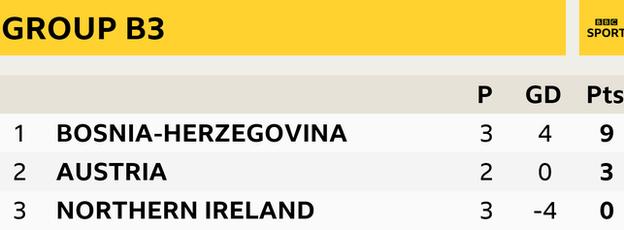
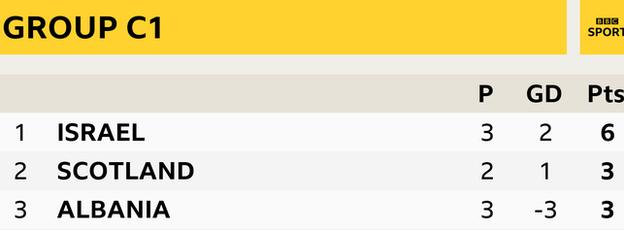
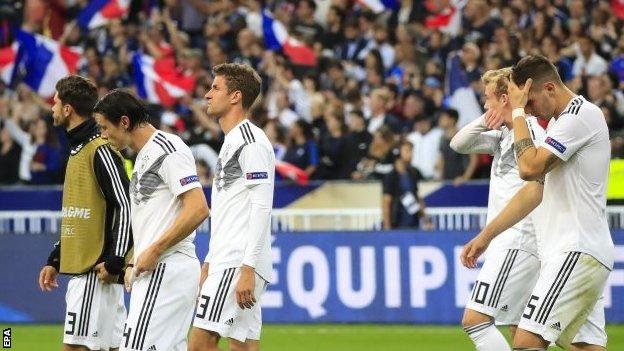
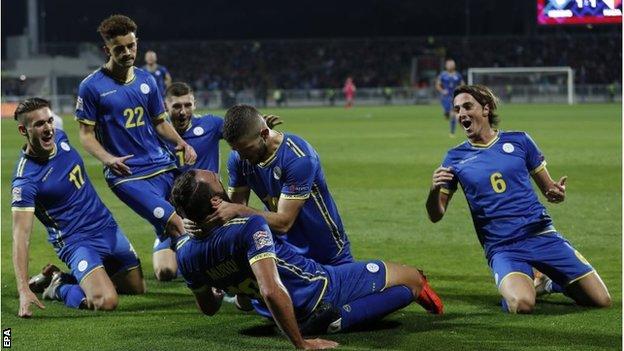
No comments